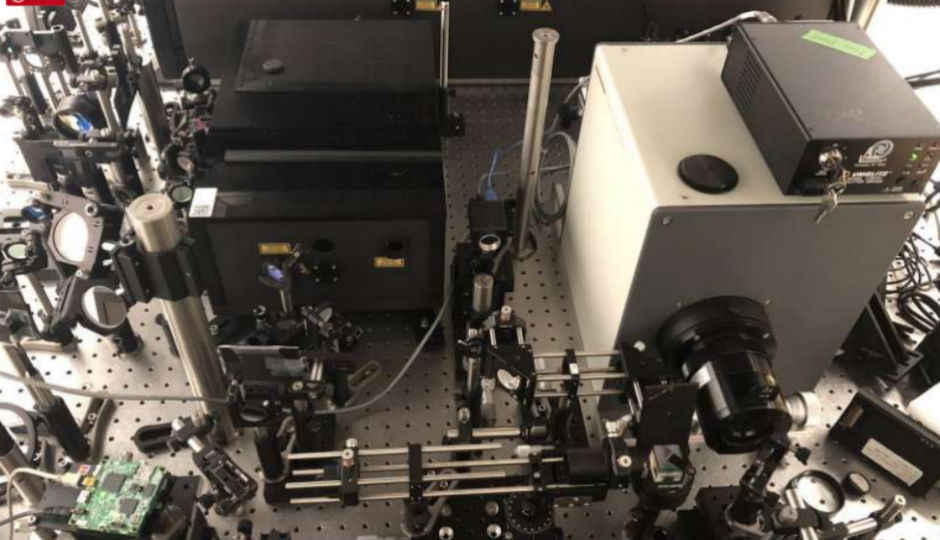 A team of researchers has designed a camera called T-CUP that can reportedly capture 10 trillion frames per second. The team said that this new camera can literally make it possible to freeze time to see the phenomenon and even light in extremely slow motion. According to the team, the camera can power a new generation of microscopes for biomedical, materials science and other applications. As per a report, the first time the ultrafast camera was used, it broke new ground by capturing the temporal focusing of a single femtosecond (10-15 ) laser pulse in real time. Science and technology news platform phys.org said that harnessing the potential of methods for microscopic analysis of dynamic phenomena in biology and physics requires a way to record images in real time at a very short temporal resolution, that too in a single exposure. It said that using current imaging techniques, measurements taken with ultrashort laser pulses must be repeated many times, “which is appropriate for some types of inert samples, but impossible for other more fragile ones.” The team started with Compressed Ultrafast Photography (CUP), in which a camera clicks 100 billion frames per second. But it did not meet the specifications required to integrate femtosecond lasers. To improve on the concept, the researchers developed the T-CUP system based on a femtosecond streak camera. “We knew that by using only a femtosecond streak camera, the image quality would be limited. So to improve this, we added another camera that acquires a static image. Combined with the image acquired by the femtosecond streak camera, we can use what is called a Radon transformation to obtain high-quality images while recording ten trillion frames per second,” says Professor Lihong Wang, Director of Caltech Optical Imaging Laboratory (COIL). For INRS professor and ultrafast imaging specialist Jinyang Liang, it's an achievement in itself. “...but we already see possibilities for increasing the speed to up to one quadrillion frames per second!” Speeds like that are sure to offer insight into as-yet undetectable secrets of the interactions between light and matter, he said. Images courtesy: phys.org
A team of researchers has designed a camera called T-CUP that can reportedly capture 10 trillion frames per second. The team said that this new camera can literally make it possible to freeze time to see the phenomenon and even light in extremely slow motion. According to the team, the camera can power a new generation of microscopes for biomedical, materials science and other applications. As per a report, the first time the ultrafast camera was used, it broke new ground by capturing the temporal focusing of a single femtosecond (10-15 ) laser pulse in real time. Science and technology news platform phys.org said that harnessing the potential of methods for microscopic analysis of dynamic phenomena in biology and physics requires a way to record images in real time at a very short temporal resolution, that too in a single exposure. It said that using current imaging techniques, measurements taken with ultrashort laser pulses must be repeated many times, “which is appropriate for some types of inert samples, but impossible for other more fragile ones.” The team started with Compressed Ultrafast Photography (CUP), in which a camera clicks 100 billion frames per second. But it did not meet the specifications required to integrate femtosecond lasers. To improve on the concept, the researchers developed the T-CUP system based on a femtosecond streak camera. “We knew that by using only a femtosecond streak camera, the image quality would be limited. So to improve this, we added another camera that acquires a static image. Combined with the image acquired by the femtosecond streak camera, we can use what is called a Radon transformation to obtain high-quality images while recording ten trillion frames per second,” says Professor Lihong Wang, Director of Caltech Optical Imaging Laboratory (COIL). For INRS professor and ultrafast imaging specialist Jinyang Liang, it's an achievement in itself. “...but we already see possibilities for increasing the speed to up to one quadrillion frames per second!” Speeds like that are sure to offer insight into as-yet undetectable secrets of the interactions between light and matter, he said. Images courtesy: phys.orgfrom Latest Technology News https://ift.tt/2CeiibA









